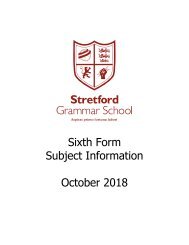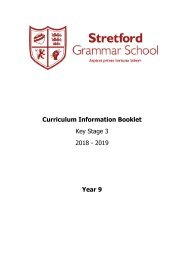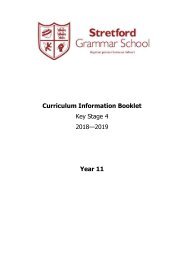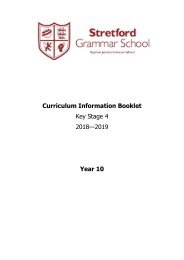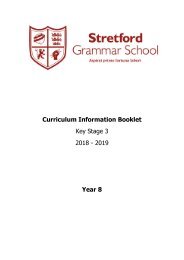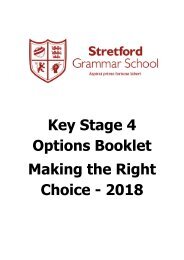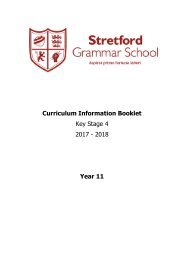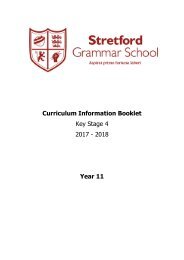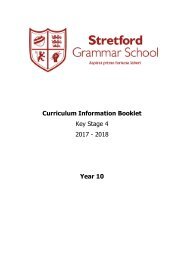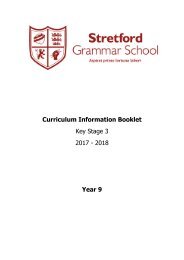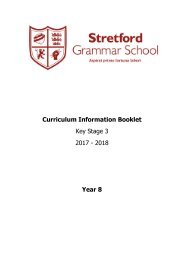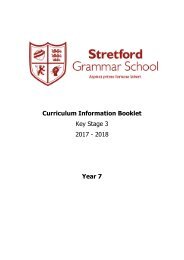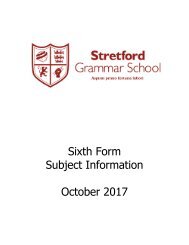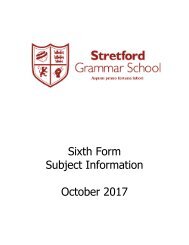Year 7 Curriculum Information Booklet 2018 - 2019
- No tags were found...
You also want an ePaper? Increase the reach of your titles
YUMPU automatically turns print PDFs into web optimized ePapers that Google loves.
<strong>Curriculum</strong> <strong>Information</strong> <strong>Booklet</strong><br />
Key Stage 3<br />
<strong>2018</strong> - <strong>2019</strong><br />
<strong>Year</strong> 7
Vision and Values<br />
Aspirat primo fortuna labori<br />
Fortune smiles on our first effort<br />
Students have identified the following as the key values of Stretford Grammar School<br />
<br />
<br />
<br />
<br />
<br />
<br />
<br />
Ambition<br />
Equality<br />
Respect<br />
Kindness<br />
Endeavour<br />
Achievement<br />
Trust<br />
Ambition is the school’s overarching value. Each term a key value is promoted<br />
through displays, the school calendar and the school website.
Calendar of Events for <strong>Year</strong> 7<br />
14 th September 4.00 pm – 5.00 pm Parent Drop In<br />
19 th September <strong>Year</strong> 7 Welcome Evening<br />
25 th September School Photographer<br />
25 th September 4.00 pm – 5.00 pm Parent Drop In<br />
5 th October 4.00 pm – 5.00 pm Parent Drop In<br />
8 th October – 10 th October Conway Residential<br />
17 th October 4.00 pm – 5.00 pm Parent Drop In<br />
19 th October Non-Uniform Day<br />
22 nd October – 26 th October Half Term<br />
30 th November – 2 nd December French Christmas Market in Lille<br />
5 th December Christmas Concert<br />
21 st December School Closes for Christmas<br />
7 th January School Re-opens for the Spring Term<br />
16 th January Parents’ Evening<br />
Week Beginning 28 th January<br />
School Performance Week<br />
11 th February – 15 th February Half Term<br />
6 th March World Maths Day<br />
20 th March Active Learning Day<br />
29 th March School Closes for Easter<br />
15 th April School Re-opens for Summer Term<br />
1 st May 7.00 pm Spring Concert<br />
7 th May – 10 th May <strong>Year</strong> 7 Examination Week<br />
27 th May – 31 st May Half Term<br />
10 th June – 11 th June Humanities Presentation Evenings<br />
9 th July Sports Day<br />
11 th July Awards Evening<br />
Week Commencing 15 th July<br />
Active Learning Week<br />
19 th July School Closes for the Summer
Assessment and Reporting<br />
The purpose of assessment is to enable an informed judgement to be made about a<br />
student’s knowledge, understanding, skills and attitude. During your child’s academic career<br />
at Stretford Grammar School assessment is a continuous process which is integral to the<br />
teaching and learning cycle. For every subject your child will be assessed at various points<br />
throughout the year and these assessments will be used to inform you about the progress<br />
that your child is making in that subject area.<br />
During each term you will receive a data capture report that contains a working at grade<br />
(WAG), a target to improve sentence and an attitude to learning grade. The WAG indicates<br />
the current level of attainment at the point in time of the report. This grade is based on the<br />
formative assessments that take place during the year.<br />
The WAG reflects the new grading system that has been introduced at GCSE. The 1-9<br />
grading system is used through Key Stage 3 and Key Stage 4. Each grade reflects a set of<br />
skills and knowledge that are specified for each subject area. Below is the expected flight<br />
path of academic progression that your child will be tracked against.<br />
<strong>Year</strong><br />
Group<br />
Progression Flight Path<br />
11<br />
10<br />
9<br />
8<br />
7<br />
Grade 1 2 3 4 5 6 7 8 9<br />
Old Grade G F E D C B A A* A* +<br />
The Working At Grade will reflect whether a student is making progress at a level that is at<br />
the top of a grade skill descriptors (+), making the expected progress within the grade skill<br />
descriptors (=), or making progress that is at the beginning of the grade skill descriptors (-).<br />
The target to improve sentences will provide your child with specific advice on how to make<br />
further progress. The attitude to learning grade reflects your child’s approach to their studies.<br />
<br />
Assessment should be based on clear, consistent criteria which are known and<br />
understood by both teachers, students and parents/carers, and are guided by<br />
national criteria and statutory requirements where appropriate.
In order to achieve consistency, assessment practice should be subject to effective<br />
moderation and standardising procedures, including regular work scrutinies, learning<br />
walks and departmental Quality Assurance.<br />
A wide range of assessment techniques should be used in different contexts and for<br />
different purposes.<br />
Assessment should provide opportunities for effective differentiation to take place.<br />
Assessment should be supported by a wide range of evidence collected over a period<br />
of time which provides a fair and thorough representation of students' skills,<br />
knowledge and understanding.<br />
Students should be involved in the assessment process so that they are encouraged<br />
to take responsibility for their own learning.<br />
The assessment process should recognise achievement, not just attainment, and<br />
seek to increase students' confidence and motivation.<br />
Assessment should support individuals in identifying strengths and weaknesses,<br />
enabling future learning to be planned through targets to improve, and assisting<br />
them in decision-making.<br />
Assessment practice should be monitored regularly and systematically and<br />
assessment procedures modified if necessary as a result.<br />
The results of assessment should be systematically recorded and used to report to<br />
parents/carers on their children's attainment.
About our curriculum<br />
All students at Stretford Grammar School follow a broad and balanced curriculum. The<br />
curriculum is designed to engage and challenge all students to thrive to achieve their full<br />
potential, both in their studies and in developing as young people equipped to live happy and<br />
fulfilling lives in modern Britain and beyond. We aim to develop confident, considerate and<br />
successful young people, who enjoy and appreciate the value of learning and citizenship,<br />
ready to make a positive contribution to their local communities and to society.<br />
Students’ social, moral, spiritual, cultural and physical development at Stretford Grammar<br />
School is essential to their development as young people. All curriculum areas contribute to<br />
this programme, alongside specialist provision within Religious Education and through the<br />
Personal, Social, Health and Citizenship Education (PSHCE) programme which focusses on the<br />
areas of sex and relationships, careers, health, democracy, the rule of law, individual liberty<br />
and mutual respect and tolerance of those with different faiths and beliefs.<br />
All students in <strong>Year</strong>s 7 to 11 follow the national curriculum which is divided into<br />
<br />
<br />
Core Subjects – English, Mathematics and Science<br />
Foundation Subjects – Art, Geography, History, Computing, Modern Foreign<br />
Languages (French, Spanish), Music, PE, Religious Education, Design Technology and<br />
PSHCE<br />
All subjects are taught in mixed ability groups in <strong>Year</strong> 7 and students will be placed into sets<br />
for some subjects from <strong>Year</strong> 8, whilst others will continue to be taught in mixed ability<br />
groupings.
<strong>Curriculum</strong> Allocation<br />
Number of lessons on a two week timetable cycle, of one hour each<br />
Art 3<br />
Design Technology 3<br />
English 6<br />
Geography 3<br />
History 3<br />
ICT and Computer Science 2<br />
Mathematics 6<br />
Modern Foreign Language 6<br />
Music 2<br />
Physical Education 4<br />
PSHCE 2<br />
Religious Education 3<br />
Science 6
Art<br />
Art is taught to all students at Stretford Grammar School at Key Stage 3, and the National<br />
<strong>Curriculum</strong> Programme of Study for Art & Design (2014) is used as the basis for curriculum<br />
planning and delivery, as this provides the most recent detailed and applicable content.<br />
Within each Unit, there may be anything from 2-4 individual items of homework set. On<br />
submission, these will be given a mark and summative/formative comments.<br />
Once a Unit is completed, the students are given a Self-Assessment sheet in which they<br />
reflect on their work, and look forward to their future development. These are then<br />
completed by Art staff with assessment and formative comments.<br />
N.B. Apart from the Entry Level Tests, for all Units of Art work at Key Stage 3 there may be<br />
variations in the processes and outcomes involved. The reason for this can be practical,<br />
such as availability of resources and materials, but is more often because the Units<br />
themselves have been designed to be open to individual staff and students’ interpretation<br />
and experimentation. This is the nature of Art.<br />
In <strong>Year</strong> 7 the aim of the year is to establish basic skills that will help the student in their Art<br />
work at Key Stage 3, and to develop the students’ confidence in a variety of techniques and<br />
outcomes. We would like them to finish the year happy with and confident in their Art work.<br />
Unit 1 – Entry Level Tasks<br />
In order for us to assess a starting level of<br />
ability for all our Key Stage 3 students,<br />
within the first few Art lessons in <strong>Year</strong> 7 we<br />
ask the students to complete the following<br />
tasks:<br />
<br />
<br />
<br />
An observational Self-Portrait<br />
classwork task using pencil, pencil<br />
shading and a mirror (1 hour).<br />
An expressive Self-Portrait classwork<br />
task using pencil, coloured pencil<br />
and a mirror (1 hour).<br />
A research presentation homework<br />
task on Vincent Van Gogh (2 hours).<br />
When these Tasks are completed, the Art<br />
staff moderate the entire <strong>Year</strong> 7 group’s<br />
work, and assign starting levels of ability,<br />
as well as Targets for the end of the <strong>Year</strong>.<br />
Unit 2 – Colour Theory<br />
Students will study the following within this<br />
Unit:<br />
<br />
<br />
<br />
Painting techniques<br />
Primary, Secondary and Tertiary<br />
Colours<br />
Complementary Colours
Tints and Shades<br />
Possible techniques include:<br />
Painting<br />
Collage<br />
Coloured Pencil<br />
Unit 3 – Fantastic Animals<br />
Students will study the following within this<br />
Unit:<br />
<br />
<br />
<br />
<br />
<br />
Coloured Ink techniques<br />
Collage techniques<br />
Illuminated Manuscripts<br />
Bosch/Breugel<br />
Mythological Creatures<br />
Possible techniques include:<br />
Collage<br />
Dip-pen & ink<br />
Coloured Ink<br />
Painting<br />
Coloured Pencil<br />
Felt-Tips<br />
Unit 4 – Repeat Patterns<br />
Students will study the following:<br />
Tessellation techniques<br />
Printmaking<br />
M.C. Escher<br />
Plane Divisions<br />
Possible Techniques include:<br />
Polystyrene Printing<br />
Coloured Pencils<br />
Felt-Tips<br />
Collage<br />
Additional <strong>Information</strong><br />
An Art Exam will take place during the year. This will take the form of a two-part practical<br />
task, including an observational homework component, and a creative design class work<br />
component.<br />
Mr. C. Lea – <strong>Curriculum</strong> Leader for Art<br />
art@stretfordgrammar.com
Design Technology<br />
Using creativity and imagination, students are encouraged to problem solve within a variety<br />
of contexts and practical skill based areas. They will work with different materials including<br />
woods, plastics and card, acquiring a broad range of subject knowledge and draw on<br />
disciplines such as mathematics, science, engineering, computing and art. In Y7, and across<br />
KS3, students will also study Food and Nutrition, where they will be taught how to cook a<br />
variety of different dishes and apply the principles of nutrition and healthy eating.<br />
Rotation 1 – Key Drawing<br />
and Presentation Skill<br />
Development<br />
Students will practise and develop a range of key<br />
drawing and presentation skills to help them<br />
communicate their ideas effectively. The skills they will<br />
cover are:<br />
<br />
<br />
<br />
Shade, tone and rendering<br />
Isometric drawing<br />
Orthographic drawing<br />
Rotation 2 – Materials and<br />
Make: Wood<br />
Students will practise and develop skill in working with<br />
wood to create their own ‘block head’ toy. They will<br />
cover a range of topics and skills within the workshop<br />
area including:<br />
<br />
<br />
<br />
<br />
<br />
<br />
<br />
Workshop health and safety<br />
Use of a tenon saw<br />
Use of the pillar drill<br />
Laminating process<br />
Marking out and measuring<br />
Knowledge and understanding of different types<br />
of woods.<br />
Design specification and idea generation<br />
Rotation 3 – Food<br />
Preparation and Nutrition<br />
Students will undertake a range of culinary tasks,<br />
developing skills in different kitchen practices. They will<br />
learn about healthy eating and balanced diets, develop<br />
skills in the use of the hob through boiling and frying,<br />
use of the oven and safe cutting techniques. Content<br />
includes:<br />
<br />
<br />
<br />
<br />
<br />
<br />
<br />
Eat well guide<br />
Kitchen health and hygiene<br />
GDA<br />
Fruit salad practical<br />
Red pepper and tomato soup practical<br />
Mushroom risotto practical<br />
Scones recipe adaption practical
Evaluation and analysis<br />
Rotation 4 – CAD<br />
Students will learn about computer aided design and<br />
how it can be used in product development and<br />
manufacture. They will apply and develop skills in the<br />
use 2D design to create an earphone wrap of their own<br />
design using the laser cutter. Students will also be given<br />
the opportunity to present their work in Autodesk<br />
Inventor as a 3D model and 3D print their outcome.<br />
Rotation 5 – STEM<br />
Competition: Beat the<br />
Flood<br />
Students work in teams to problem solve in a real life<br />
context. The challenge involves applying skills in Science,<br />
Technology, Engineering and Maths to design and build<br />
a flood resistant structure which will then be put to the<br />
test as part of a whole year group competition. Students<br />
will study the geography of the environment and<br />
consider social and economic factors affecting their<br />
communities in order to problem solve and create and<br />
effective model structure that will ‘beat the flood’.<br />
Additional <strong>Information</strong><br />
There may be a small cost to some rotation areas over the year in order to support the<br />
department provide practical materials for design and make based projects. You will be<br />
always be fully informed in advance and in writing by the department, and support is<br />
available for any students with any financial concerns.<br />
Mr. A. Palmer – <strong>Curriculum</strong> Leader for Design Technology (Maternity Cover)<br />
design@stretfordgrammar.com
English<br />
English is taught to all students in <strong>Year</strong> 7. Most classes will have a dedicated teacher,<br />
although some classes are shared. Students follow the same curriculum at the same time,<br />
regardless of which class they are in. Work centres around the study of some whole and<br />
some part texts, including those taken from other cultures and the English Literary Heritage.<br />
Unit 1 – Autobiography<br />
Students will study extracts from famous<br />
fiction and non-fiction autobiographies by<br />
writers including Roald Dahl, Charles<br />
Dickens and Meera Syal. They will practise<br />
and develop the following skills:<br />
<br />
<br />
<br />
<br />
Imaginative first person narrative<br />
story-telling<br />
Reflecting, editing, re-drafting and<br />
improving written work<br />
Understanding how authors create a<br />
sense of character, time, place and<br />
atmosphere<br />
Writing about texts in an<br />
appropriate analytical style<br />
Assessment: Autobiographical writing;<br />
analysis of character / setting<br />
Unit 2 – The Breadwinner<br />
Students will complete a class reading of<br />
Deborah Ellis’s novel The Breadwinner,<br />
about a girl growing up in Afghanistan<br />
under Taliban rule in the 1990s. They will<br />
practise and develop the following skills:<br />
<br />
<br />
<br />
<br />
<br />
Empathetic and creative response to<br />
character<br />
The significance of context in<br />
studying and writing about texts<br />
What fiction can teach us about<br />
world history, human rights and<br />
other cultures<br />
Writing in different text types<br />
Appreciation of authorial skill<br />
Assessment: Letter writing<br />
Unit 3 – The Science of Invention<br />
Students will study a range of non-fiction<br />
texts with cross-curricular relevance. They
will practise and develop the following<br />
skills:<br />
<br />
<br />
<br />
The conventions of non-fiction<br />
information texts<br />
How to undertake useful and<br />
appropriate research<br />
Speaking and listening skills<br />
Assessment: A formal spoken presentation<br />
Unit 4 – Poetry<br />
Students will study a range of poems,<br />
including some from other cultures and<br />
from the English Literary Heritage. They<br />
will practise and develop the following<br />
skills:<br />
<br />
<br />
<br />
<br />
Understanding the range of<br />
methods used by poets to create<br />
meaning<br />
Responding to poetry both<br />
empathetically and analytically<br />
Applying the skills of the poet<br />
creatively<br />
Understanding poetic narrative<br />
Assessment: A formal analytical essay<br />
about a poem<br />
Unit 5 – Introduction to Shakespeare<br />
Students will be introduced to the context<br />
of Elizabethan England and will read and<br />
study extracts from A Midsummer Night’s<br />
Dream, developing and practising the<br />
following skills:<br />
<br />
<br />
<br />
Handling the challenges of<br />
Shakespearean language<br />
Understanding the importance of<br />
Shakespeare’s influence on British<br />
culture<br />
Performing Shakespeare<br />
Assessment: Shakespeare content is not<br />
formally assessed. There will be a <strong>Year</strong> 7<br />
exam at the end of this unit, which will<br />
assess reading and writing skills
Unit 6 – Great Expectations<br />
Students will read an abridged (but not<br />
simplified) version of Charles Dickens’ novel<br />
about Pip. They will practise and develop<br />
the following skills:<br />
<br />
<br />
<br />
<br />
Understanding and handling the<br />
language of 19 th Century texts<br />
Understanding how themes can be<br />
built systematically throughout a<br />
text<br />
Responding empathetically to<br />
character and situation<br />
Writing in an analytical style about<br />
character and setting<br />
Assessment: A formal analytical essay<br />
about character<br />
Additional <strong>Information</strong><br />
Students will be given a novel for private reading in the first term of <strong>Year</strong> 7. There will be<br />
independent homework tasks allocated on a weekly basis to monitor and assess the<br />
progress of this reading.<br />
Independent reading of fiction, non-fiction, newspapers and magazines, as well as watching<br />
documentaries and listening to talk radio are all activities to be widely encouraged in young<br />
students of English.<br />
Mr. S. Howell – <strong>Curriculum</strong> Leader for English<br />
english@stretfordgrammar.com
Geography<br />
Geography is taught to all students at Stretford Grammar School and involves the studying<br />
of a range of Physical and Human Geography topics. There is a focus on the local and<br />
national scale Geography of Manchester and the United Kingdom respectively, as well as an<br />
in depth look at the continent of Africa. Students will also complete a range of literacy and<br />
numeracy skills including extended writing and graphical techniques. Lessons will be a<br />
mixture of discussion, independent work, enquiry and ICT skills.<br />
Unit 1 - Who am I?/What is<br />
Geography<br />
Students will study the following:<br />
<br />
<br />
<br />
<br />
baseline assessment to establish<br />
prior knowledge<br />
fieldwork assessment based on data<br />
collected from <strong>Year</strong> 5 students at<br />
our previous open evening<br />
how our own local, national and<br />
international links can shape our<br />
identity<br />
the concepts of latitude and<br />
longitude<br />
Unit 2 – All About Manchester<br />
Students will study the following:<br />
<br />
<br />
<br />
<br />
<br />
OS map skills in relation to our local<br />
area<br />
assessment – What is the best site<br />
for Manchester? Analysing why the<br />
Romans chose the site they did for<br />
the original settlement<br />
population change in Manchester<br />
regenerating Manchester after<br />
industrial decline<br />
migration and multicultural<br />
Manchester<br />
Unit 3 – Flood Alert<br />
Students will study the following:<br />
<br />
<br />
<br />
the causes of floods<br />
flood management decisions<br />
the use of GIS to assess and<br />
manage flood risk
Unit 4 – Into Africa<br />
Students will study the following:<br />
<br />
<br />
<br />
<br />
<br />
Physical and Human Geography of<br />
Africa<br />
scale and diversity in Africa<br />
misconceptions of Africa<br />
Sierra Leone and the diamond curse<br />
Ghana - an economic success story<br />
Unit 5 – Coastal Landscapes<br />
Students will study the following:<br />
types of waves and their effect on<br />
the coastline<br />
erosional landforms produced by<br />
wave action<br />
depositional landforms produced by<br />
wave action<br />
the effects of coastal erosion on<br />
people<br />
Additional <strong>Information</strong><br />
The end of year exam will cover topics that have been studied over the course of the year<br />
and will be a mixture of multiple choice, short answer questions and extended responses.<br />
Miss E. Eeles – <strong>Curriculum</strong> Leader for Humanities<br />
geography@stretfordgrammar.com
History<br />
The principal aim of the History and Politics Department is to encourage interest in, and<br />
enjoyment of, the past and to understand how it impacts on the present and the future.<br />
Students should be inspired and stimulated by the teaching they receive and they will be<br />
encouraged to widen their historical knowledge and develop skills which are readily<br />
transferable to the wider curriculum.<br />
The Department believes that students should be encouraged to think for themselves and<br />
become inquisitive and critical citizens of the future. Students explore relevant questions<br />
which will show the importance of the past.<br />
Unit 1:<br />
England before Hastings<br />
Who were the Vikings?<br />
Who were the Anglo Saxons?<br />
Unit 2:<br />
Why was England a Battlefield in<br />
1066?<br />
How far did the Normans change<br />
England?<br />
Unit 3:<br />
Where the middle Ages measly?<br />
Where the English a welcoming nation<br />
in the Middle Ages?<br />
What was England like before 1066?<br />
What were the ‘invasions’ of<br />
England before 1066?<br />
Where the Vikings raiders or<br />
traders?<br />
Understand how historians know<br />
the past: What evidence do we<br />
have?<br />
Who were the Anglo Saxons and<br />
how did they live?<br />
Why was there rivalry for the throne in<br />
1066?<br />
Why did William win in 1066?<br />
How was William I able to take<br />
control by 1076?<br />
o Feudalism<br />
o Church<br />
o Town and village life.<br />
o Legal system<br />
o Government<br />
Why did the Anglo - Saxons rebel<br />
and fail?<br />
How should we remember William<br />
I?<br />
Field Study: Castle Visit<br />
Life in the middle ages:<br />
Towns and villages<br />
Jobs and leisure<br />
The Black death and its impact<br />
The Peasants Revolt and its impact<br />
Crime and punishment.<br />
Pastors letters of Love and family<br />
Why were the Jews invited to<br />
England and then expelled?
Unit 4:<br />
Why was religion so important in<br />
people’s lives in the middle Ages?<br />
Unit 5:<br />
Why did the English go on the<br />
Crusades?<br />
<br />
<br />
<br />
<br />
<br />
<br />
<br />
<br />
<br />
<br />
<br />
Who migrated to England in the<br />
middle ages?<br />
Why did they come?<br />
Ideas of Heaven and Hell<br />
What was the role of the church in<br />
everyday life?<br />
What was the impact of religion in<br />
the middle ages?<br />
o Architecture<br />
o Crime and punishment<br />
o Warfare<br />
o Medicine<br />
The rise of Islam<br />
Significance of Jerusalem<br />
What were the motivations of the<br />
Crusaders<br />
What happened?<br />
What were the consequences?<br />
Why do interpretations of Saladin<br />
differ?<br />
Unit 6:<br />
Who had more power the church or<br />
state?<br />
<br />
<br />
<br />
Who had more power the Church or<br />
state?<br />
o Becket and Henry II<br />
How powerful were the English<br />
Monarchs?<br />
o Magna Carta<br />
o Edward I – Castles<br />
o Wales and Scotland<br />
How important were the English<br />
Medieval Queens?<br />
o Matilda and Stephen<br />
o Eleanor of Aquitaine<br />
The legacy and significance of the Middle<br />
Ages.<br />
Opportunities are available to take part in debate club on Fridays.<br />
Additional <strong>Information</strong><br />
Homework support is also available at lunch times and after school.<br />
An educational visit to Caernarfon Castle is also planned for all students to support their field<br />
study in History.<br />
Mrs. H. Allerton – <strong>Curriculum</strong> Leader for History and Politics<br />
history@stretfordgrammar.com
ICT & Computer Science<br />
ICT and Computer Science are taught to all students at KS3 at Stretford Grammar School. In<br />
<strong>Year</strong> 7 the students follow a programme of study based on the English national curriculum.<br />
Unit 1 – Digital literacy and e-safety<br />
Unit 2 – Managing data using<br />
spreadsheets<br />
Unit 3 – Legal aspects of Computing<br />
Unit 4 – Games programming<br />
Students will study the use of networked<br />
computers to plan and create school work.<br />
This unit includes:<br />
<br />
<br />
<br />
<br />
Effective use of Word processing<br />
software<br />
Online research and presenting of<br />
work to a target audience<br />
E-safety<br />
Basics of cyber security<br />
Students will begin to model situations<br />
using data, perform calculations, and<br />
analyse the results. This unit includes:<br />
<br />
<br />
<br />
<br />
Structuring data<br />
Performing calculations on data sets<br />
Presenting data<br />
Testing and modifying data models<br />
Students will study and reflect on legislation<br />
relating to the use of computers in the UK.<br />
This unit includes:<br />
<br />
<br />
<br />
<br />
<br />
Computer misuse<br />
Copyright<br />
Data protection<br />
Harassment<br />
Security and social engineering<br />
Students will use software to create a game<br />
using programming instructions to define all<br />
rules and actions in the game. This unit<br />
includes:<br />
<br />
<br />
<br />
<br />
Abstracting game concepts<br />
Use of selection, sequence and<br />
iteration in programming<br />
Use of variables and data structures<br />
Coordinates and vectors in games<br />
Additional <strong>Information</strong><br />
Mr. J. Stenhouse – <strong>Curriculum</strong> Leader for Computer Science.<br />
computing@stretfordgrammar.com
Mathematics<br />
Maths is taught to all students at Stretford Grammar School, following the National<br />
<strong>Curriculum</strong> for Mathematics. Students are taught in their (mixed-ability) tutor groups.<br />
Unit 1 – Data Data Handling Project: collecting<br />
and processing data; displaying<br />
findings<br />
Unit 2 – Number Factors and Multiples of a number<br />
Divisibility<br />
Prime Numbers<br />
Indices and Roots<br />
Unit 3 – Geometry Angles: terminology and properties<br />
Unit 4 – Algebra Algebraic manipulation<br />
Using formulae<br />
Unit 5 – Algebra Sequences: generating and finding<br />
rules<br />
Unit 6 – Number Place value<br />
Calculation and solving problems<br />
with decimals<br />
Calculation and solving problems<br />
with negative numbers<br />
Unit 7 – Data Understand and use averages<br />
Draw and interpret statistical<br />
diagrams<br />
Unit 8 – Number Calculate and solve problems with<br />
fractions<br />
Unit 9 – Shape Transformations: translate, reflect<br />
and rotate a shape<br />
Recognise properties of shapes:<br />
symmetry and congruence<br />
Unit 10 – Algebra Form and solve linear equations<br />
Unit 11 – Shape Recognise and draw representations<br />
of 3D shapes<br />
Use drawing equipment to construct<br />
shapes, given certain information<br />
Construct nets of solids<br />
Unit 12 – Shape Calculate areas and perimeters of<br />
simple 2D shapes
Compound shapes<br />
Volume and surface area of 3D<br />
shapes<br />
Unit 13 – Algebra Understand and draw graphs of<br />
linear relationships<br />
Find the gradient of a straight line<br />
Unit 14 – Probability Calculate simple probability, using<br />
theoretical and experimental<br />
methods<br />
Unit 15 – Number Understand and calculate with<br />
percentages<br />
Calculate simple percentage change<br />
Ratio and simple proportion<br />
Additional <strong>Information</strong><br />
Students have the opportunity to participate in the UK Junior Maths Challenge. Selection for<br />
this is made in the Spring Term.<br />
Mr. C.J. McAvoy – <strong>Curriculum</strong> Leader for Mathematics<br />
maths@stretfordgrammar.com
Modern Foreign Languages : French<br />
French is taught to half the year group at Stretford Grammar School and in <strong>Year</strong> 7<br />
students follow the scheme of work set in the Studio 1 digital resource. <strong>Year</strong> 7 is the<br />
perfect time to inspire language learning to build a strong springboard for their future<br />
learning of French.<br />
Unit 1 – C’est perso (It’s personal)<br />
Students will learn how to talk about<br />
themselves:<br />
Mon autoportrait. My self-portrait.<br />
Mon kit de survivre. My survival kit.<br />
Comment je me vois. How I see myself.<br />
Et les autres? And the others?<br />
Il est hypercool! It is supercool!<br />
Unit 2 - Mon college (My School)<br />
Students will learn to talk about their<br />
school in French:<br />
Mes matières. My subjects.<br />
C’est genial! It great!<br />
J’ai cours! I have a lesson!<br />
Au collège! At school!<br />
Miam – miam! Yum,yum!<br />
Mon collège au paradis. My school in<br />
paradise.<br />
Joyeux Noël. Merry Christmas.<br />
Unit 3 – Mes passetemps (My hobbies)<br />
Students will learn to talk about their<br />
free time:<br />
Mon ordi et mon portable. My computer and my<br />
mobile.<br />
Tue s sportif/ sportive? Are you sporty?<br />
Qu’est-ce que tu fais? What do you do?<br />
J’aime faire ça! I like doing that!<br />
J’adore les sports extremes!<br />
I love extreme sports!
Unit 4 – Ma zone! (my area)<br />
Students will learn to talk about where they<br />
live in French:<br />
Là oú j’habite. Where I live.<br />
Perdu dans le par d’atttractions. Lost in the theme<br />
park.<br />
Le weekend! The weekend!<br />
Coucou! Hello!<br />
Qu’est-ce qu’on peut faire à . . .?<br />
What can we do at. . . ?<br />
Unit 5- 3…2…1, partez! (3,2,1, let’s<br />
go!)<br />
Students will learn to talk about their future holiday<br />
plans:<br />
Les vacances, mode d’emploi!<br />
Je me prepare. . . I’m getting ready . . .<br />
Au café de la Plage. At the beach café.<br />
Je vais aller en colo! I’m going to go on<br />
holiday!<br />
Mes rêves. My dream (holiday).<br />
Additional <strong>Information</strong><br />
Students will learn about the culture from a variety of different Francophone countries.<br />
They will have a strong grammatical understanding and they will always be encouraged to<br />
use French spontaneously in the classroom.<br />
Miss C. Ashall – <strong>Curriculum</strong> Leader for Modern Foreign Languages<br />
mfl@stretfordgrammar.com
Modern Foreign Languages : Spanish<br />
Spanish is taught to half the year group at Stretford Grammar School and in <strong>Year</strong> 7<br />
students follow the scheme of work set in the ¡Viva! 1 digital resource. <strong>Year</strong> 7 is the<br />
perfect time to inspire language learning to build a strong springboard for their future<br />
learning of Spanish.<br />
Unit 1 – Mi vida (My life)<br />
Unit 2 - Mi tiempo libre (My free time)<br />
Students will learn how to talk about the<br />
following aspects of their lives:<br />
¿Cómo te llamas? Introducing yourself and<br />
making friends.<br />
¿Tienes hermanos? Talking about siblings<br />
¿Cuándo es tu cumpleaños? Talking about<br />
birthdays<br />
¿Tienes mascotas? Talking about pets.<br />
Cómo soy. Talking about what you are like.<br />
Students will learn to talk about their free<br />
time in Spanish:<br />
¿Qué te gusta hacer? What do you like to<br />
do in your free time?<br />
¿Cantas karaoke? Do you sing Karaoke?<br />
¿Qué haces cuando llueve? What do you<br />
do when it rains?<br />
¿Qué deportes haces? Which sports do<br />
you do?<br />
¿Eres fanático? Are you a fan?<br />
¿Qué haces en tu tiempo libre? What do<br />
you do in your spare time?<br />
La navidad en España.<br />
Christmas in Spanish.<br />
Unit 3 – Mi insti (My school)<br />
Students will learn to talk about their<br />
school and school life:<br />
¿Qué estudias? What do you study?<br />
¿Te gustan las ciencas? Do you like<br />
Science?<br />
¿Qué hay en tu insti? What is there in your<br />
school?<br />
Durante el recreo. During break<br />
¿Te gusta tu insti? Do you like your school?<br />
¿Cómo es tu insit? What is your school<br />
like?<br />
La educación en España : Education in<br />
Spain
Unit 4 – Mi familia y mis amigos (My<br />
family and friends).<br />
Students will learn to talk about their family,<br />
friends and home life.<br />
¿Cuántas personas hay en tu familia?<br />
How many people are there in your family?<br />
¿De qué color son los ojos? What colour<br />
are your eyes?<br />
¿Cómo es? What is he/she like?<br />
¿Cómo es tu casa o tu piso? What is your<br />
house or flat like?<br />
El carnival en famila. Family celebrations.<br />
Autorretrato. Video production all<br />
about yourself.<br />
Unit 5- Mi ciudad (my town)<br />
Students will learn to talk about their town.<br />
¿Qué hay en tu ciudad? What is there in<br />
your town?<br />
¿Qué haces en la ciudad? What do you<br />
do in town?<br />
En la cafeteria. In the café<br />
¿Qué vas a hacer? What are you going<br />
to do?<br />
¿Te gusta tu ciudad? Do you like your town?<br />
Mi vida en la Habana. My life in Havana.<br />
Additional <strong>Information</strong><br />
Students will learn about the culture from a variety of different Hispanic countries. They<br />
will have a strong grammatical understanding and they will always be encouraged to use<br />
Spanish spontaneously in the classroom.<br />
Miss C. Ashall – <strong>Curriculum</strong> Leader for Modern Foreign Languages<br />
mfll@stretfordgrammar.com
Music<br />
Music is taught to all students at Stretford Grammar School and the aim is to ensure<br />
students can read Musical Notation of various forms, compose and perform in different<br />
styles and be able to identify key features of different Musical Genres by the end of <strong>Year</strong> 9<br />
in order to prepare them for KS4. Lessons are mainly practical with an opportunity to<br />
work alone, in pairs and in larger groups for half termly assessments. Some lessons will<br />
include some written, listening and brief analysis work. There is always a wide variety of<br />
extension tasks for those students who play an instrument and read Music so they have<br />
the same level of challenge as someone in the class who is new to the subject.<br />
Unit 1 - Introduction and the<br />
Elements of Music<br />
Unit 2 – Musical instruments and<br />
developing Performing skills<br />
Students will:<br />
<br />
<br />
<br />
<br />
<br />
<br />
Complete a baseline assessment to<br />
find out prior knowledge which<br />
includes written, listening and<br />
practical activities.<br />
Understand and use the Elements<br />
of Music to compose short<br />
compositions.<br />
Learn to read graphic scores and<br />
perform from them<br />
Take part in whole class singing to<br />
prepare for the Christmas Concert<br />
Look at rhythm patterns and be<br />
able to use them in groups.<br />
Have an introduction to reading<br />
and performing on keyboards using<br />
stave notation.<br />
This unit includes:<br />
<br />
<br />
<br />
<br />
<br />
<br />
<br />
How sound is produced and how<br />
different Musical instruments work.<br />
Introduction to the 5 finger<br />
keyboard technique.<br />
Whole class performance work to<br />
develop ensemble skills.<br />
Learning riffs and looking at how<br />
layers of Music can be used.<br />
Composing Pentatonic ostinato<br />
patterns which can then be<br />
performed.<br />
Refining whole class singing and<br />
performance as a <strong>Year</strong> group in the<br />
Christmas Concert.<br />
Termly evaluation and test of work<br />
covered since September.
Unit 3 – Rhythm and Pulse<br />
Students will study the following:<br />
<br />
<br />
<br />
<br />
<br />
Understanding the difference<br />
between rhythm and pulse.<br />
Composing more adventurous<br />
rhythm patterns and performing in<br />
groups.<br />
Looking at Samba Music and<br />
rhythms.<br />
Perform compositions based on<br />
Samba rhythms and features.<br />
Preparation for the Spring Concert.<br />
Unit 4 – Traditional Music of the<br />
British Isles<br />
Students will study the following:<br />
<br />
<br />
<br />
<br />
The features of Folk Music<br />
Performing and singing using the<br />
aural tradition.<br />
Compund time signatures and be<br />
able to use Jig rhythms when<br />
performing and composing.<br />
Preparing a folk song for the Spring<br />
Concert.<br />
Unit 5 – Developing Performance and<br />
Composition skills<br />
Students will study the following:<br />
<br />
<br />
<br />
<br />
Look at the concept of steps and<br />
leaps in Music and how it affects<br />
performing and composing.<br />
Performing Music that follows an<br />
AABA structure.<br />
Introduction to the Chromatic scale<br />
and composing using it for a<br />
purpose / story.<br />
Performing a folk song at the<br />
Spring Concert.<br />
Unit 6 – Mystery and Imagination<br />
Students will study the following:<br />
<br />
<br />
<br />
<br />
<strong>Year</strong> 7 listening and written<br />
examination.<br />
20 th Century techniques that<br />
composers use including Serialism,<br />
Aleatoric Music, extended use of<br />
Graphic scores<br />
The will also spend time<br />
performing, composing and<br />
listening in each of the different<br />
styles.<br />
This unit consolidates the work<br />
completed over the year.
Additional <strong>Information</strong><br />
Opportunities are available to have instrument lessons for 20 minutes or more with a<br />
specialist instrument teacher. All students are encouraged to get involved at least one of<br />
the many extra-curricular clubs on offer.<br />
An educational visit to see the Halle Orchestra to support the learning is available in March<br />
of <strong>Year</strong> 7.<br />
Mrs. K. Swales – <strong>Curriculum</strong> Leader for Music<br />
music@stretfordgrammar.com
Physical Education<br />
PE is an integral element of the curriculum and accessible to all students. Students<br />
undertake four hours of PE over the two week timetable cycle.<br />
Boys – Term 1<br />
Students will undertake the following key<br />
elements<br />
<br />
<br />
<br />
<br />
Fitness<br />
Football<br />
Cross Country<br />
Gym<br />
Girls – Term 1<br />
Students will undertake the following key<br />
elements<br />
<br />
<br />
<br />
Netball<br />
Fitness<br />
Cross Country<br />
Boys – Term 2<br />
Students will study the following key<br />
elements<br />
<br />
<br />
<br />
<br />
Rugby Union<br />
Rugby League<br />
Basketball<br />
Hockey<br />
Girls – Term 2<br />
Students will study the following key<br />
elements<br />
<br />
<br />
<br />
<br />
<br />
Dance<br />
Rugby<br />
Netball<br />
Football<br />
Hockey<br />
Boys – Term 3<br />
Students will study the following key<br />
elements<br />
<br />
<br />
<br />
<br />
Handball<br />
Athletics<br />
Tennis<br />
Cricket<br />
Girls – Term 3<br />
Students will study the following key<br />
elements<br />
<br />
<br />
Athletics<br />
Tennis
Rounders<br />
Additional <strong>Information</strong><br />
Opportunities are provided for students to undertake sports outside of the timetabled<br />
curriculum.<br />
Mr. S. Hodgson – <strong>Curriculum</strong> Leader for PE<br />
sport@stretfordgrammar.com
PSHCE<br />
PSHCE is taught to all students, however, there is a parental/carer right of withdrawal from<br />
Sex and Relationships Education. The taught element covers areas such as financial<br />
capability, careers and emotion and healthy well being.<br />
Unit 1 – Being Me<br />
Students will study issues relating to<br />
personal identity and the influences they<br />
have on the choices they make:<br />
<br />
<br />
<br />
<br />
<br />
What makes us human?<br />
Who do I think I am?<br />
What is meant by a group identity<br />
and how can we develop this in<br />
school?<br />
What influences the choices we<br />
make?<br />
What are the origins for my name?<br />
Unit 2 – Diversity<br />
Students will study the issue of stereotyping<br />
various groups in society ad how these can<br />
be challenged:<br />
<br />
<br />
<br />
<br />
<br />
What influences the attitudes I<br />
have?<br />
What is a stereotype and what<br />
stereotypes are there?<br />
How can we develop empathy for<br />
others and how would this look?<br />
Disability discrimination in society<br />
Sex discrimination in society<br />
Unit 3 – Health Matters<br />
Students will study issues relating to body<br />
image in their own lives and how the media<br />
influences this. They will examine the<br />
changes happening in the body and<br />
investigate drugs in our society:<br />
<br />
<br />
<br />
<br />
<br />
<br />
Body image and the media<br />
Healthy eating and exercise<br />
A healthy body and a healthy mind<br />
The changes brought about by<br />
puberty<br />
The media as as an influence on<br />
body image<br />
Drugs – an introduction to the law<br />
and different types of drug – legal<br />
and illegal
Unit 4 – Relationships<br />
Students will study the different<br />
relationships and roles they have whilst<br />
investigating ways of managing conflict:<br />
<br />
<br />
<br />
<br />
<br />
The importance of different<br />
relationships<br />
The individual nature of a<br />
relationship<br />
Communicating within a relationship<br />
Handling conflicts within friendship<br />
groups<br />
Relationships as something to be<br />
celebrated<br />
Unit 5 - Risk<br />
Students will study issues relating to peer<br />
pressure and how they can analyse the risk<br />
when making a decision:<br />
<br />
<br />
<br />
<br />
<br />
What do we mean by risk?<br />
How are risk and temptation linked?<br />
Peer pressure – balancing<br />
expectations<br />
First Aid<br />
How to reduce risk<br />
Unit 6 – Your Money and Your Life<br />
Students will study staying safe on line and<br />
the risks and benefits of shopping on line –<br />
looking particularly at scams and fraud:<br />
<br />
<br />
<br />
<br />
Cyber bullying<br />
Staying safe on line – mobiles,<br />
computers and tablets<br />
The risks and benefits of buying on<br />
line<br />
How can I tell what is true or not on<br />
line?<br />
Additional <strong>Information</strong><br />
PSHCE is closely linked with the programme within form time and with assemblies to<br />
reinforce learning outside of taught lessons.<br />
Mr. I. Nicholson – Assistant Headteacher<br />
pshce@stretfordgrammar.com
Religious Education<br />
RE is taught to all students at Stretford Grammar School and in <strong>Year</strong> 7 the Trafford Agreed<br />
Syllabus for Religious Education 2016 is used as the basis for curriculum planning and<br />
delivery. Parents/carers have the right of withdrawal from the teaching of some or all of RE.<br />
Unit 1 – What is challenging about<br />
being religious in the UK Today?<br />
Students will study the following key areas<br />
with reference to Christianity, Islam,<br />
Sikhism and Buddhism:<br />
<br />
<br />
<br />
<br />
What do we mean by commitment<br />
and identity?<br />
Religious prejudice and<br />
discrimination in the UK and how<br />
religions tackle this<br />
Key beliefs from Christianity, Islam,<br />
Sikhism and Buddhism in relation to<br />
the fundamentals of faith<br />
Reflection on the challenges faced<br />
by teenagers in relation to being<br />
religious in the UK<br />
Unit 2 – Why is there suffering in the<br />
world?<br />
Students will study the following key areas<br />
with reference to Christianity and<br />
Buddhism:<br />
<br />
<br />
<br />
<br />
<br />
The origins of suffering according to<br />
religion<br />
The problem of evil and a Creator<br />
God<br />
How Buddhism regards the problem<br />
of evil without a Creator God<br />
How people can overcome suffering<br />
What are the solutions to evil and<br />
suffering in the world today?<br />
Unit 3 – How relevant is religion in the<br />
21 st Century?<br />
Students will study the following key areas<br />
with reference to Christianity:<br />
<br />
<br />
<br />
What is the relevance of religious<br />
texts and teaching today?<br />
Ethical theory – situation ethics and<br />
Joseph Fletcher<br />
How radical was Christianity in the<br />
first century?
Unit 4 – How can religious people<br />
express spirituality through art and<br />
music?<br />
Students will study the following key areas<br />
with reference to Christianity, Islam,<br />
Judaism and Shintoism<br />
<br />
<br />
<br />
<br />
What is meant by the concept of<br />
spirituality?<br />
How can music show what people<br />
believe about God and about life?<br />
How can art and calligraphy express<br />
meanings about the nature of the<br />
universe and of God?<br />
What is meant by the concept of<br />
holy?<br />
Additional <strong>Information</strong><br />
Educational visits to see religion as a lived experience are offered during <strong>Year</strong> 7 so that<br />
students can place their learning about religion in context.<br />
Mrs. R. Lea – <strong>Curriculum</strong> Leader for Religious Education<br />
religion@stretfordgrammar.com
Science<br />
Science is taught to all students at Stretford Grammar School and the aim is to ensure that<br />
all students develop a good understanding of basic scientific concepts, start to develop their<br />
understanding of the practical applications and start to learn how to apply their knowledge<br />
in practical applications. Lessons include a balance of written work, research and project<br />
work. Practical work is used in a majority of lessons to introduce concepts or to help<br />
students visualise scientific concepts. Practical work is completed in pairs or in larger<br />
groups. Student progress is assessed via a combination of classwork, homework tasks,<br />
short topic tests and longer termly tests.<br />
KS3 Science is taught over two years and helps students to develop the knowledge and skills<br />
to help them prepare for the GCSE course.<br />
Topic 1 Introduction to Practical Work<br />
Students will study the following:<br />
<br />
<br />
<br />
How to use apparatus safely<br />
How to assess Hazards and the<br />
associated risks in order to plan to<br />
avoid the risks<br />
An introduction to practical concepts<br />
such as validity and precision<br />
Topic 2 Forces<br />
Students will study the following:<br />
<br />
<br />
<br />
<br />
What is a force and how to<br />
represent it?<br />
Developing practical skills<br />
investigating springs and friction.<br />
Why things float?<br />
How to find the density of regular<br />
and irregular shapes.<br />
Topic 3 Particles<br />
Students will study the following:<br />
<br />
<br />
<br />
<br />
How particles are arranged in solids<br />
liquids and gases<br />
The properties of the 3 states of<br />
matter<br />
What happens in changes of state<br />
How particles move
Topic 4 Solutions<br />
Students will study the following:<br />
<br />
<br />
<br />
<br />
What solutions and mixtures are<br />
How to separate mixtures through<br />
filtration, evaporation, distillation<br />
and chromatography<br />
Carrying out heating procedures<br />
safely<br />
What saturated solutions are<br />
Topic 5 Cells, tissues and organs<br />
Students will study the following:<br />
<br />
<br />
<br />
<br />
<br />
Introduction to cells and use of<br />
models to explain scientific theory<br />
Plant and animal cells<br />
Using microscopes to observing cells<br />
Structure and function of specialised<br />
cells<br />
Introduction to organ systems,<br />
including breathing, digestion and<br />
reproduction<br />
Topic 6 Energy resources<br />
Students will study the following:<br />
<br />
<br />
<br />
<br />
How to classify the different types of<br />
energy<br />
How energy is transferred and<br />
where it comes from.<br />
An introduction to Fossil fuels and<br />
renewable energy sources.<br />
Experiments on the energy stored in<br />
different fuel types and in food<br />
Topic 7 Simple chemical reactions<br />
Students will study the following:<br />
<br />
<br />
<br />
<br />
<br />
<br />
The differences between physical<br />
changes and chemical reaction<br />
How to recognise a chemical<br />
reaction<br />
Different types of chemical reactions<br />
including thermal decomposition,<br />
endothermic and exothermic<br />
Understanding what happens during<br />
a chemical reaction<br />
Representing chemical reactions<br />
using equations<br />
How to identify a variety of gases
Topic 8 Electricity<br />
Students will study the following:<br />
<br />
<br />
<br />
<br />
Learn the symbols for circuit<br />
components<br />
Gain competency in building and<br />
fault finding on simple circuits<br />
Investigating different circuit types<br />
by measuring and calculating<br />
current, potential difference and<br />
resistance<br />
Using analogies to help others<br />
better understand circuits<br />
Topic 9 Nutrition and digestion<br />
Students will study the following:<br />
<br />
<br />
<br />
<br />
<br />
Food groups<br />
How to conduct food tests<br />
What makes a healthy and<br />
unhealthy diet<br />
What digestion is and the role of<br />
enzymes<br />
Practical work to investigate<br />
digestion<br />
Topic 10 Acids and Alkalis<br />
Students will study the following:<br />
<br />
<br />
<br />
<br />
<br />
The properties of acids and alkalis<br />
How acids and alkalis can be<br />
identified<br />
Neutralisation reactions<br />
Uses of neutralisation<br />
Writing equations for neutralisation<br />
reactions<br />
Topic 11 Reproduction, drugs and<br />
health<br />
Students will study the following:<br />
<br />
<br />
<br />
<br />
<br />
<br />
The changes that occur to your<br />
body during puberty<br />
The male and female reproductive<br />
system and how this alters with<br />
adolescence<br />
Fertilisation and the development of<br />
the foetus<br />
The menstrual cycle<br />
Reproduction in plants<br />
Seed dispersal<br />
Reproduction is a national curriculum topic and students cannot be removed from lessons.<br />
The content of material covered in lessons is suitable for students aged 11 and 12.
Topic 12 Space<br />
Students will study the following:<br />
<br />
<br />
<br />
<br />
The different objects large and small<br />
that make up the universe.<br />
The arrangement of our solar<br />
system and how objects are<br />
classified.<br />
What causes the periodic patterns of<br />
the seasons and the moon?<br />
How to detect life beyond our<br />
planet.<br />
Additional <strong>Information</strong><br />
Students have the opportunity to take part in a range of STEM related competitions and<br />
clubs organised by the department throughout the year.<br />
Mrs. G. Sutton – <strong>Curriculum</strong> Leader for Science<br />
science@stretfordgrammar.com
<strong>Year</strong> 7 Homework Guidance – 7S<br />
Homework expectations over a two week timetable. Homework in Design Technology and<br />
Music will be set every two weeks.<br />
M1 T1 W1 Th1 F1 M2 T2 W2 Th2 F2 Total<br />
Art 30 30<br />
DT<br />
English 30 30 30 30 120<br />
Geography 30 30<br />
History 30 30 60<br />
Computing 30 30<br />
Mathematics 30 30 30 90<br />
MFL 30 30 60<br />
Music<br />
RE 30 30<br />
Science 30 30 60<br />
<strong>Year</strong> 7 Homework Guidance – 7T<br />
M1 T1 W1 Th1 F1 M2 T2 W2 Th2 F2 Total<br />
Art 30 30<br />
DT<br />
English 30 30 30 30 120<br />
Geography 30 30<br />
History 30 30 60<br />
Computing 30 30<br />
Mathematics 30 30 30 90<br />
MFL 30 30 60<br />
Music<br />
RE 30 30<br />
Science 30 30 60
<strong>Year</strong> 7 Homework Guidance – 7R<br />
M1 T1 W1 Th1 F1 M2 T2 W2 Th2 F2 Total<br />
Art 30 30<br />
DT<br />
English 30 30 30 30 120<br />
Geography 30 30<br />
History 30 30 60<br />
Computing 30 30<br />
Mathematics 30 30 30 90<br />
MFL 30 30 60<br />
Music<br />
RE 30 30<br />
Science 30 30 60<br />
<strong>Year</strong> 7 Homework Guidance – 7O<br />
M1 T1 W1 Th1 F1 M2 T2 W2 Th2 F2 Total<br />
Art 30 30<br />
DT<br />
English 30 30 30 30 120<br />
Geography 30 30<br />
History 30 30 60<br />
Computing 30 30<br />
Mathematics 30 30 30 90<br />
MFL 30 30 60<br />
Music<br />
RE 30 30<br />
Science 30 30 60
<strong>Year</strong> 7 – Homework Guidance – 7E<br />
M1 T1 W1 Th1 F1 M2 T2 W2 Th2 F2 Total<br />
Art 30 30<br />
DT<br />
English 30 30 30 30 120<br />
Geography 30 30<br />
History 30 30 60<br />
Computing 30 30<br />
Mathematics 30 30 30 90<br />
MFL 30 30 60<br />
Music<br />
RE 30 30<br />
Science 30 30 60



